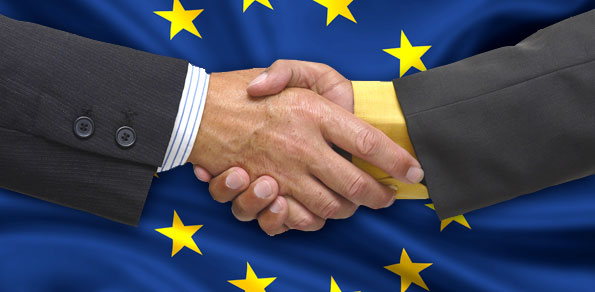Twenty five European countries have finally endorsed the fiscal pact. They’ve agreed to enshrine balanced budget legislation into their national law, with annual structural deficits capped at 0.5% of GDP. Transgressors face penalties of 0.1% of GDP, with fines being added to Europe’s bailout fund, the European Stability Mechanism (ESM). The UK and the Czech Republic have (so far) declined to sign. The UK having further marginalised itself from the decision making were Europe is concerned.
A new Treaty on Stability, Coordination and Governance (SCG) will come into force once it’s been passed by the parliaments of at least 12 countries out of the 17 who use the euro. Euro area leaders have also confirmed that they’ll reassess whether the ESM, and its conceptual predecessor the European Financial Stability Facility (EFSF), has sufficient capital to act as a firewall, the ESM will come into force in July 2012.
EU leaders have also agreed to a new drive in order to stimulate growth and create employment particularly for young people. Unused development funds will be used to create jobs. They also vowed to help small and medium enterprises access to credit, and to use the Single Market as a key driver for Europe’s economic growth.
Germany’s unemployment rate has fallen to a new post-unification low. But in Italy, the unemployment rate has hit its highest level in at least eight years. Data released this morning highlights the importance of youth job creation, the number of people out of work in Germany fell to a seasonally adjusted 34,000 to 2.85 million in January, a 20-year low cutting the German unemployment rate to 6.7%. Italy’s unemployment rate has risen to 8.9%, the highest since national statistics body Istat began tracking the data in January 2004.
Leaders opposed the suggestion that a ‘commissioner’ should be installed in Greece to oversee its budget decisions. French president Nicolas Sarkozy warned that this would be undemocratic, as “the recovery process in Greece can only be enacted by the Greeks themselves.”
Eurozone countries will be barred from receiving financial help from the European Stability Mechanism if they don’t endorse the fiscal compact, encouraging leaders to sign up quickly.
Market Overview
The Stoxx Europe 600 Index added 0.6 percent as of 8:04 a.m. in London, bringing its January rally to 3.9 percent. Standard & Poor’s 500 Index futures rose 0.3 percent. The euro rose 0.2 percent, while the dollar fell against most of its 16 major counterparts. Oil gained 0.7 percent as copper and gold climbed.
Oil increased to $99.46 a barrel. Japan is the world’s third-largest crude consumer. Spot gold advanced 0.6 percent to $1,740 an ounce. The metal has climbed 11 percent this month, the best advance since August. Silver added 0.7 percent to $33.748 an ounce, bringing its January gain to 21 percent.
The euro strengthened to $1.3164. Euro-area unemployment probably rose to 10.4 percent in December, the highest since 1998, from 10.3 percent the previous month, according to the median estimate of economists surveyed by Bloomberg. The European Union statistics office releases the full data later today.
Market snapshot at 10:00 am GMT (UK time)
Asian and Pacific markets experienced mostly modest gains in the early morning session. The Nikkei closed up 0.11%, the Hang Seng closed up 1.14% and the CSI closed up 0.14%, the ASX 200 closed down 0.24%. European bourse indices are mostly positive due to the renewed optimism concerning the fiscal pact and Germany’s post unification low unemployment figures. The STOXX 50 is up 0.95%, the FTSE up 0.55%, the CAC is up 1.1% and the DAX is up 0.97%. The MIB is up 1.59%. The SPX equity index future is up 0.44%. ICE Brent crude is up $0.81 a barrel and Comex gold is up $10.55 an ounce.
The euro gained 0.3 percent to $1.3181 at 8:40 a.m London time after falling 0.6 percent yesterday, the biggest decline since Jan. 13th. The shared currency climbed 0.2 percent to 100.51 yen. The dollar dropped 0.1 percent to 76.26 yen after sliding to 76.18 yen, the weakest level since Oct. 31.
The euro is headed for its first monthly advance versus the dollar and the yen since October. The shared currency has appreciated 1.7 percent versus the greenback, and risen 0.8 percent against the yen.





